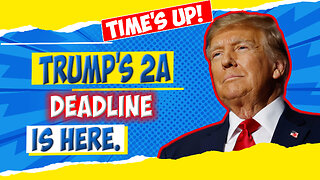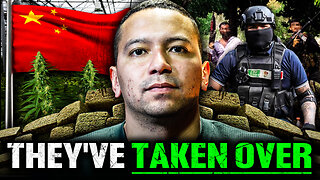Premium Only Content

Coin Bureau about SDGs
"The SDGs are a set of 17 milestones that
every country is supposed to meet by 2030. The SDGs
appear to be the origin of things like digital IDs, CBDCs
and that 2030 date you see everywhere. Antonio (
Guterres) goes on to explain that these policies can
only be achieved with the help of so-called
stakeholders, a world that effectively refers to the
world's most powerful individuals and institutions.
Note that private sector stakeholders want profits and
public sector stakeholders want control. This is why
both parties are obsessed with digitization. Plugging
everyone into the system increases profits and makes
it easier to control them. Antonio laments the fact that
some people aren't as plugged in as others and seems
to imply that this is the reason why inequality is
growing around the world. Some would say that the
real reason inequality is growing is because central
banks and governments are lining their pockets and
the pockets of their cronies using money that's been
printed or taken from the average person via taxation.
Antonio also laments the fact that new and innovative
technologies such as AI and crypto are not being
sufficiently governed, that is controlled. He seems to
applaud digitization that resulted from the pandemic
and seems to imply that this is the direction the world
should go in. Antonio ends the introduction by saying
that a "global digital compact" is necessary to "achieve
the governance required for a sustainable digital
future". By now you'll know that governance means
control and you'll also notice that Antonio threw the
word sustainable in there out of nowhere. This could
be a subtle reference to the individual carbon credit
credit score system the UN is trying to set up. Lo and
behold the SDGs are literally highlighted in blue.
Antonio then stresses that we must fully digitize the
remaining 2.7 billion people ASAP. Incredibly he seems
to acknowledge that not everyone want to be a part of
this system. He says that a "demand pull" is also
needed and that this is where the public sector can
play a role. He explains that they can do this by
making things like digital ID mandatory to access
public health services. Antonio includes "schools and
cultural services" in this list which begs the question
of whether you'll eventually need to show a digital ID
to get an education or practice your religion. Knowing
Antonio the answer is probably YES. At least this
digital prison will be sustainable, renewable, green
etc."
-
 1:05:28
1:05:28
Sports Wars
6 hours agoLebron GOES OFF Over Bronny Hate, Pereira LOSES Belt To Ankalaev At UFC 313, Xavier Worthy Arrested
33.1K8 -
 10:27
10:27
Tactical Advisor
1 day agoDMR or SPR for Civilian Use?
44.1K6 -
 8:21
8:21
DEADBUGsays
1 day agoThe Crossbow Killer
37.2K14 -
 8:40
8:40
Tundra Tactical
23 hours ago $8.45 earnedThe Executive Order Wishlist.
46.5K2 -
 7:22:52
7:22:52
SpartakusLIVE
22 hours agoSaturday SPARTOON Solos to Start || Duos w/ StevieT Later
130K3 -
 28:40
28:40
SLS - Street League Skateboarding
8 days agoTOP MOMENTS IN WOMEN’S SLS HISTORY! ALL THE 9’s - Rayssa Leal, Leticia Bufoni, Chloe Covell & more…
92.7K11 -
 2:03:03
2:03:03
The Connect: With Johnny Mitchell
20 hours ago $8.02 earnedHow Mexican & Chinese Cartels Control Illegal Marijuana Cultivation In America Using SLAVE Labor
49.1K8 -
 14:46
14:46
Mrgunsngear
21 hours ago $3.37 earnedPrimary Arms GLx 1x Prism With ACSS Reticle Review
50.3K8 -
 22:37
22:37
Degenerate Plays
20 hours ago $0.80 earnedI'm A Psychic Now - Elden Ring : Part 73
30.6K -
 2:32:02
2:32:02
Jamie Kennedy
13 hours agoEp. 195 Horror Legend Barbara Crampton
31.5K1